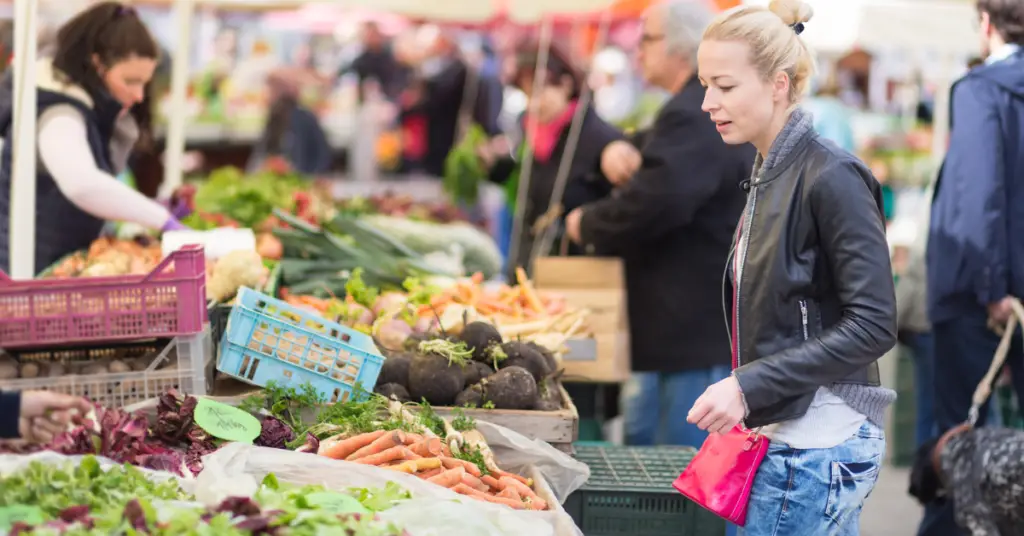Buying locally grown fresh food is much easier than you might think and prices are often competitive with conventionally distributed crops. While it may not be easy to find all of your favorite foods locally, your extra efforts will be worthwhile to the health of our planet.
The thought of fresh Chilean grapes may be exotic and enticing during a bleak New York winter, but the transportation cost in terms of greenhouse gas emissions is extremely high—and truly bad for the environment.
By buying locally produced foods, you reduce our global dependency on the jet fuel used to fly so many perishables around the world, therefore locally grown food is better for the environment.
Referred to as “food miles,” the distances foods are transported have steadily increased during the past 10 years and play a big part in effecting climate change by increasing traffic congestion, car accidents, and pollution, equaling more greenhouse gas emissions.
When you buy locally produced organic foods, Here’s what you get in exchange, these are the advantages of locally grown food:
- Fresher, more nutritious food. Locally grown fruits and vegetables are usually harvested within 24 hours of being purchased by the consumer. Produce picked at the height of freshness tastes better and is more nutritionally complete.
- Higher nutritional value. Nutritional value declines, often dramatically, as time passes after harvest, and post-harvest handling and storage practices can also reduce the levels of antioxidants. While some vegetables are picked prematurely to allow for ripening during transportation, vine ripening is better for producing the best tasting, most nutrient-dense foods.
- Increased regional economic health. Buying locally grown foods keeps money within the community and produces a stronger local economy. This contributes to the health of all sectors of the local economy and increases the local quality of life.
- Support for self-sufficient communities. A community that producesits own food can better influence how it is grown. It is also less reliant on far away food producers, which would be critical in the case of a natural disaster or national security crisis if major transportation routes were blocked.
- Help for preserving biodiversity. Farmers selling locally are not limited to the few varieties of fruits and vegetables selected for long distance shipping, high yields and shelf life. Often they raise and sell wonderful heirloom varieties that may be hard to find in supermarkets.
- Preservation of the rural character of the land. Supporting local farmers means maintaining local farmland, which is much better for the local climate than putting up malls and parking lots.
- Avoidance of post-harvest contamination. Foods sold in local markets without the need for extensive storage and transportation will likely contain minimal or no waxes and/or fungicides applied to protect the product after harvest.
One of the easiest ways to buy your food locally is to go to your local farmers’ market. It is a great way to enjoy people-watching and find some local heirlooms, like tomatoes of all shapes and colors, some rich in lycopene, others in related nutritious carotenoids.
Indeed, the fastest growth segment of the produce industry is the local farmers’ market, where people are coming in droves to buy locally grown foods and to reconnect with their communities and the earth.
Community Supported Agriculture (CSA) is a way for the food-buying public to create a relationship with a farm and to receive a weekly basket of produce. By making a financial commitment to a farm, you become a shareholder or subscriber.
Many CSA farms offer produce subscriptions, where buyers receive a weekly or monthly basket of produce, flowers, fruits, eggs, milk, coffee, or any type of farm products. Some CSA farms also require that members work a small number of hours on the farm during the growing season, which typically runs from late spring through early fall.
The number of CSA farms in the United States was estimatedat 50 in 1990 and has since grown to more than 1,000. This is a very promising trend; let’s continue to support local food producers and halt global warming in its tracks!

Erzsebet Frey (Eli Frey) is an ecologist and online entrepreneur with a Master of Science in Ecology from the University of Belgrade. Originally from Serbia, she has lived in Sri Lanka since 2017. Eli has worked internationally in countries like Oman, Brazil, Germany, and Sri Lanka. In 2018, she expanded into SEO and blogging, completing courses from UC Davis and Edinburgh. Eli has founded multiple websites focused on biology, ecology, environmental science, sustainable and simple living, and outdoor activities. She enjoys creating nature and simple living videos on YouTube and participates in speleology, diving, and hiking.

